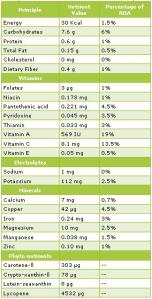
Watermelon has BIG benefits. Turns out this sweet and juicy treat is loaded with a compound that increases blood flow, much the same way Viagra and other "performance" drugs do!
Did you know that is it also nutrition packed too? Yes, watermelon is 92 percent water, but that other 8 percent is filled with good nutrition and amazing health benefits; so many benefits that we consider it a power food and give weekend web Watermelon Boot Camps with it.
Health benefits of watermelon:
Rich in electrolytes and water content, melons are nature’s gift to beat tropical summer thirst.
Watermelon is an excellent source of Vitamin-A, which is a powerful natural anti-oxidant. 100 g fresh fruit provides 569 mg or 19% of daily-required levels of this vitamin. It is essential for vision and immunity. Vitamin-A is also required for maintaining healthy mucus membranes and skin. Consumption of natural fruits rich in vitamin-A is known to protect from lung and oral cavity cancers.
Watermelon may have Viagra-like effect. It contains citrulline, which can trigger production of a compound in the body that helps relax the body’s blood vessels, in a way similar to what happens when a man takes Viagra, according to a Texas A&M study.
Watermelon is a very good source of potassium; it helps muscle and nerve function. It can ease inflammation that contributes to conditions like asthma, atherosclerosis, diabetes, colon cancer, and arthritis.
Watermelon is a certified heart healthy food by the American Heart Association.
Watermelon is the anti-oxidant lycopene leader among fresh fruits and vegetables. Deep red varieties of watermelon have replaced the tomato as the lycopene king. The red pigment — also found in apricots, pink grapefruit, and papaya — is an important antioxidant. It has been found to be helpful in reducing the risk of prostate, breast, and endometrial cancers, as well as lung and colon cancer. Lycopene’s ability to neutralize singlet oxygen radicals was better than the antioxidant abilities of beta-carotene and vitamin E. (Source: Archives of Biochemistry and Biophysics in 1989)
Furthermore, it contains a good amount of vitamin-B6 (pyridoxine), thiamin (vitamin B-1), vitamin-C, and manganese. Consumption of foods rich in vitamin-C helps the body develop resistance against infectious agents and scavenge harmful oxygen-free radicals. Manganese is used by the body as a co-factor for the antioxidant enzyme, superoxide dismutase.

Sources:
http://www.nutrition-and-you.com
http://www.realage.com
http://www.care2.com
USDA National Nutrient data base
hi
ReplyDeletethank you fo da chart :3
ReplyDeletethank you fo da chart :3)
ReplyDeletehi hi its jin fong again tank you fo da chart now i know da nutrition
ReplyDeletei give u 5 star rating if i know how to
ReplyDeletewhere u creator get chart? u genius fo a person... tank you again watermelon taste so good and now i eat a lot of it. tank you.
ReplyDeletecan u get chart fo da cheese? tank you... it would be great if u can... jin fong out.
ReplyDeletea quote by jin fong... hi hi its jin fong again i recomend you da watermelon fruit becuz it so good and healthy
ReplyDeleteWe can really benefit from knowing that food is like medicine to our bodies. Great posts on health!
ReplyDeleteThanks a lot!
ReplyDeletei just love watermallon
ReplyDeleteGreat post. Very revealing. Thank you
ReplyDeleteA viagra-like effect? Now THAT is news!!!
DeleteThanks!
DeleteHi Jin, Thank you!
Delete:)
ReplyDeleteA reason for me to give watermelon another chance!
ReplyDeleteThanks Abiola!
ReplyDeleteIf you want to eat watermelon for its nutritious value, you are better off storing it at room temperature than refrigerating it. Levels of beta carotene are double and levels of lycopene are 20% higher, say researchers from the USDA Agricultural Research Service, Lane, Oklahoma, USA.
ReplyDelete